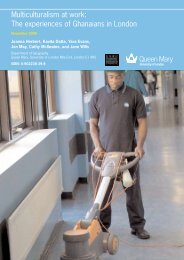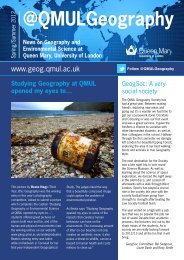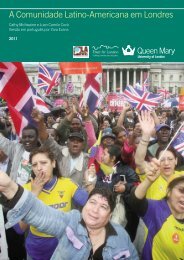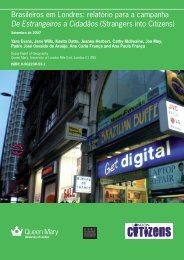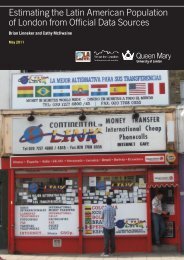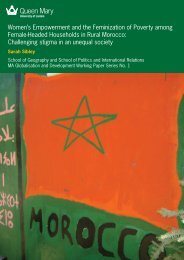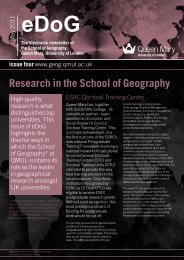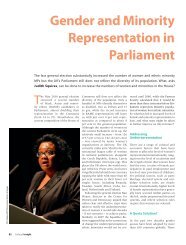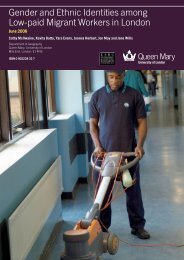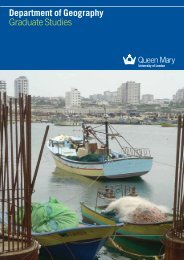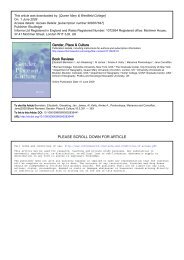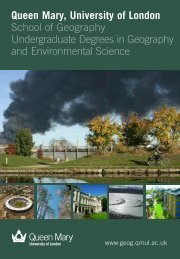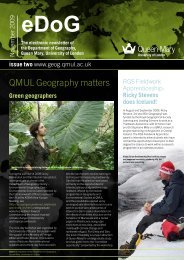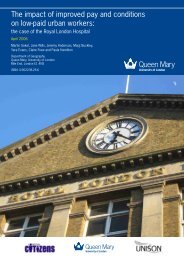The Colombian community in London - Geography - Queen Mary ...
The Colombian community in London - Geography - Queen Mary ...
The Colombian community in London - Geography - Queen Mary ...
- No tags were found...
You also want an ePaper? Increase the reach of your titles
YUMPU automatically turns print PDFs into web optimized ePapers that Google loves.
It is important to po<strong>in</strong>t out that those on lower <strong>in</strong>comes make major economic sacrifices to<br />
send money home (Datta et al., 2007). For <strong>in</strong>stance, 28% of professional and managerial<br />
workers and 25% of elementary workers sent more than £5,000 even though elementary<br />
workers earned considerably less. Evidence of hardship emerged <strong>in</strong> the qualitative research<br />
with those on low <strong>in</strong>comes experienc<strong>in</strong>g the most difficulties. 55 year-old Tomas (<strong>in</strong>terviewed<br />
<strong>in</strong> 2005) noted that he had worked really hard <strong>in</strong> the past <strong>in</strong> order to send money to his ex-wife<br />
and children <strong>in</strong> Colombia:<br />
„I worked tremendously hard. Not any more, but <strong>in</strong> the past I killed myself. I used to get<br />
up at 4am, and work all day and all night … I worked to support them, and because of<br />
this I have noth<strong>in</strong>g here because I sent it all to them. I also sent to my brothers and my<br />
family. For me, December signified millions as I gave presents to everyone‟.<br />
In a more extreme case, 56 year-old Hernan (<strong>in</strong>terviewed <strong>in</strong> 2005) was mak<strong>in</strong>g huge sacrifices<br />
for his family <strong>in</strong> Colombia, liv<strong>in</strong>g <strong>in</strong> dire circumstances <strong>in</strong> <strong>London</strong> <strong>in</strong> order to be able to send<br />
money to his wife and daughter. He sent £290 per month back home, leav<strong>in</strong>g only £25-£30 for<br />
himself. He used this ma<strong>in</strong>ly for transport costs (only travell<strong>in</strong>g by bus as this was cheaper)<br />
and he fed himself through an occasional can of sard<strong>in</strong>es, or through out-of-date sandwiches<br />
that a friend saved for him from her job <strong>in</strong> a café. He lived clandest<strong>in</strong>ely <strong>in</strong> a workshop <strong>in</strong><br />
Waterloo arriv<strong>in</strong>g late at night after the owner had left and leav<strong>in</strong>g early <strong>in</strong> morn<strong>in</strong>g before he<br />
arrived back (he had obta<strong>in</strong>ed the key from a former employee).<br />
Most people sent money home for family ma<strong>in</strong>tenance 20 (56.5%) highlight<strong>in</strong>g the importance of<br />
remittances for the daily survival of families and <strong>in</strong>dividuals. However, while this was the ma<strong>in</strong><br />
use of remittances, the most common secondary uses were pay<strong>in</strong>g off debts, education<br />
expenses and house build<strong>in</strong>g (6% <strong>in</strong> each case) and people often sent for more than one<br />
reason. <strong>The</strong>refore, Hernan (see above) not only sent money for liv<strong>in</strong>g expenses but he had<br />
also sent enough <strong>in</strong> three and a half years for his wife to build a new house and an extra<br />
storey that was be<strong>in</strong>g rented out <strong>in</strong> order to provide extra <strong>in</strong>come. In many cases, remittances<br />
are also used to fund the migration of family members to the UK. Marcelo (<strong>in</strong>terviewed <strong>in</strong><br />
2005) not only paid for his wife‟s education <strong>in</strong> Colombia (at university where she tra<strong>in</strong>ed to be<br />
a teacher), but also for her and their son‟s fare to jo<strong>in</strong> him.<br />
Only once families back home received enough to live from, did migrants th<strong>in</strong>k about<br />
channell<strong>in</strong>g funds <strong>in</strong>to <strong>in</strong>vestments or collective remittances. In general, there was little<br />
evidence of widespread collective remittance-send<strong>in</strong>g through Home Town Associations<br />
(where specific organisations are set-up to channel funds <strong>in</strong>to the home areas of migrants).<br />
However, a couple of cases were reported; one was by 50 year-old Alejandro (<strong>in</strong>terviewed <strong>in</strong><br />
2005) who had established a <strong>community</strong> organisation that did a lot of small-scale fund-rais<strong>in</strong>g<br />
to develop projects <strong>in</strong> his home area. One of these was a cancer rehabilitation centre where<br />
those who had had chemotherapy could go to recover. Similarly, 50 year-old Jaime<br />
(<strong>in</strong>terviewed <strong>in</strong> 2005) who had been a <strong>community</strong> leader <strong>in</strong> Colombia had cont<strong>in</strong>ued to work<br />
for his <strong>community</strong> <strong>in</strong> <strong>London</strong> with the support of his church (San Ignacio <strong>in</strong> Seven Sisters),<br />
aga<strong>in</strong> through fund-rais<strong>in</strong>g to develop projects for the elderly and poor.<br />
<strong>The</strong> few cases that emerged from the qualitative research were <strong>in</strong>formal. For example, 34<br />
year-old Nuria (<strong>in</strong>terviewed <strong>in</strong> 2005) sent money to set-up and run a school restaurant for<br />
malnourished children <strong>in</strong> the <strong>community</strong> where she used to work; 27 year-old Adriana<br />
(<strong>in</strong>terviewed <strong>in</strong> 2005) sent money to <strong>community</strong> leaders <strong>in</strong> her home village to distribute to the<br />
very poor; and 39 year-old Susana (<strong>in</strong>terviewed <strong>in</strong> 2005) cont<strong>in</strong>ued to help the displaced<br />
peasants she had worked with previously by organis<strong>in</strong>g fund-rais<strong>in</strong>g events among her friends.<br />
Economic vulnerability <strong>in</strong> <strong>London</strong> is also l<strong>in</strong>ked with the phenomenon of reverse remittances.<br />
20 This <strong>in</strong>cludes food, rent and household bills.<br />
35



